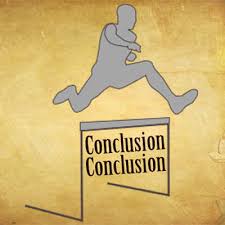
Man is too quick at forming conclusions- Edward E. Barnard
John was driving home late one night when he picked up a hitchhiker. As they rode along, he began to be suspicious of his passenger. John checked to see if his wallet was safe in the pocket of his coat that was on the seat between them, but it wasn’t there! So he slammed on the brakes, ordered the hitchhiker out, and said, “Hand over the wallet immediately!” The frightened hitchhiker handed over a billfold, and John drove off. When he arrived home, he started to tell his wife about the experience, but she interrupted him, saying, “Before I forget, John, do you know that you left your wallet at home this morning?”.
Jumping to conclusions. It would be great if we could raise our hands and say we’ve never done it, but we all know better, don’t we? Many of us as leaders have been too quick to jump to a conclusion about a person or situation only to regret that decision later. We didn’t wait for all the facts and we let our imaginations get the best of us. In the heat of the moment we made a decision only to regret it later.
As leaders our gut-instincts are critical. We come to rely on our perceptions and intuition and hopefully more times than not they serve us well. So how can we avoid those embarrassing times when we blow it and our conclusions are wrong? Here are a few tips worth considering.
Give people the benefit of the doubt
Not every idea is a bad idea and not all of your ideas are the best. Be open minded enough to hear out the people in your organization and what they have to offer. Appreciate the diversity of thought in your organization and the people who act in good faith to add value. When people fall short of your expectations be willing to work with them to find ways to improve. Don’t write them off too soon.
Cynical leaders are a drag on the organization because in due time the people in your organization are going to recognize it and as a result will be less likely to bring forth their ideas if all you are going to do is criticize it.
Seek inclusion and input
Your stock as a leader is going to go up as you bring more people to the table and work together. The buffer to your cynicism rests in your ability to hear from everyone. Even if your gut instinct about an idea or person turns out to be correct chances are in the natural course of inclusion and discourse it can be resolved.
By bringing people to the table it can validate your suspicions or it can erase them. Be willing to hear from all sides before jumping to a conclusion you may come to regret later.
Sleep on it
I’ve regretted not doing this way too many times. But sometimes the best thing to do when faced with a dilemma or decision is to just sleep on it. Often time afterward the situation looks much different and you have a much better perspective.
By sleeping on it and thinking things through one thing is for certain – you will not wake up with regrets about making the wrong call. Patience is a hard virtue to come by, and I admit it’s not always mine. But it’s better to make the right decision off a good night sleep than not being able to sleep knowing you blew it.
Check your motives
Before jumping to conclusions about people or ideas within your organization why not check your own motives at the door. What is the basis for the conclusion you’ve come to? What is your motivation? Have you openly and honestly played all of your cards for the benefit of the team? What are you holding back? Do you have your own agenda you are trying to protect?
Yes, these questions all sound like the very ones we use to come to our conclusions about other people, right? Well, perhaps as leaders it’s time to turn the tables and do a little soul-searching of our own.
As a leader it is important to trust your instincts and intuition and not jump to conclusions. Be quick to listen, slow to speak, and even slower in jumping to conclusions.
© 2016 Doug Dickerson
